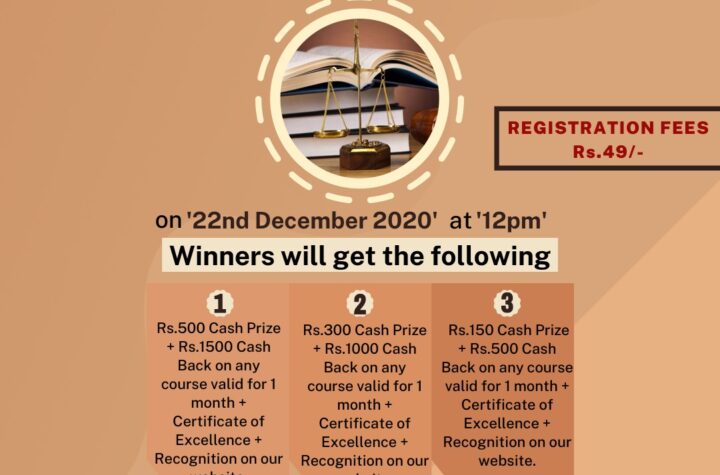About the Organizer:
NLSIU, the Nation’s premier law university, came into existence through a Notification under the National Law School of India University Act (Karnataka Act 22 of 1986). It signified the efforts by Judiciary, BCI, Karnataka Bar Council, Bangalore University and the Government of Karnataka to reform legal education. Also, to establish a center of excellence for legal education and research in India.
CEERA, established in 1997 is a benefactor of the Ministry of Environment, Forest & Climate Change (MoEF&CC), Government of Karnataka, Bar and Bench in India and abroad. Building an environmental law database and community, effectively networking among stakeholders and policy research in the area of environment are CEERA’s main objectives. For which, CEERA has successfully been able to build functional and professional linkages with government agencies and non-governmental organisations in India and at International levels.
About the Webinar:
In an age when India is witnessing a staggering rise in industrialisation and development, the country is correspondingly facing environmental degradation at a rapid pace. The resultant drastic changes have severe consequences to the natural world. In order to deter these damaging consequences from materialising, a robust legal system regulating environmentally damaging anthropogenic activities should exist. In particular, the presence of a sound judicial system to reinforce these regulations is crucial.
Today, there is a plethora of constitutional and legislative provisions on environmental protection in India. In addition to this, over the past few decades, environmental activism and litigation has captured an increased momentum. Besides this, the judiciary has also played a pivotal role by developing and strengthening the environmental jurisprudence in India.
In light of this, the webinar on “The Future of Environmental Litigation in India” aims to understand and analyze the contours of environmental litigation in India and its future prospects as an instrument for achieving environmental justice.
Who may Attend?
- Lawyers, Legal Professionals, Consultants, Academicians, and Law Students.
- Officers of the Ministry of Environment, Forest & Climate Change, Officers of the various Pollution Control Boards, etc.
- Industry Professionals, Environmental engineers, EHS managers.
- Representatives from Companies or other Institutions.
- Representatives of Governing and Regulatory Bodies.
- Government Officers, Officers of Public Sector Undertakings.
Themes for the Webinar:
- Judicial/Legal Activism in ensuring Environmental Justice
- Environmental Justice/ and Public Interest Litigation
- Vindication of Rights in Environmental Law (human rights, rights of nature, animal rights)
- Intersectional Environmentalism, human rights and health.
- Role of adjudicatory Bodies in interpretation and implementation of
environmental legislation in India.
- Environmental non-compliance and role of the Judiciary
- Ex Ante and post facto litigation challenges
- NGT: Quasi-Judicial impact assessment.
- Environmental Justice and International law
- Application of Environmental Justice to combat global challenges
Important Dates/Deadlines:
- Last Date for Submission of Abstract: 4th August 2020
- Last Date for Registration: 4th August 2020
- Submission of Full-Length Papers: 30th September 2020
- Dates of Webinar: 7th and 8th August 2020
Venue:
Zoom Webinar Conference
Registration Fees:
Participants may register by paying a registration fee of INR 500/- (Rupees Five hundred only) per participant through DD or NEFT.
Submission:
All Abstracts to be sent via e-mail to geethanjali[at]nls.ac.in or lianne[at]nls.ac.in.
Submission Guidelines:
- Abstracts of not more than 500 words, on the above-mentioned themes, are invited, submitted as Word documents, with a covering letter containing the name and designation of the author(s).
- There may be a maximum of only two Authors for each Abstract/Paper, and all participants are permitted to enjoin as co-author a maximum of one Abstract/Paper only.
- The full-length research papers in case of short articles should be 3500 – 5000 words (inclusive of footnotes), and around 8000 words (inclusive of footnotes) in case of long articles.
- Potential contributors are required to adhere to a uniform mode of citation (20th edition of The Bluebook: A Uniform System of Citation is recommended).
Contact Information:
Rohith Kamath, B.A., LL.M., ACS
Phone number: +91-9686481506

![CfP: Webinar on The Future of Environmental Litigation in India by CEERA, NLSIU [Aug 7-8]: Register by Aug 4](https://www.lawputra.com/wp-content/uploads/2020/07/webinar-2636738_1280-1024x382.jpg)



